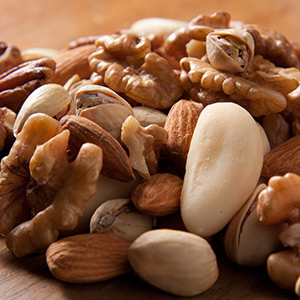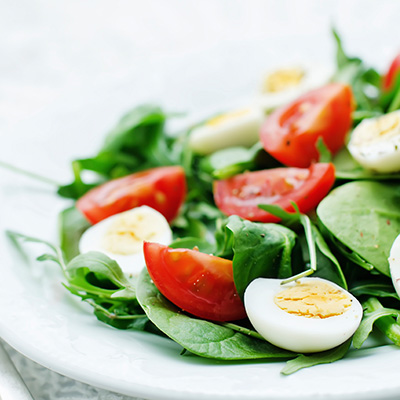- 4 Québec products to add to your recipes
- 10 Ways to Eat More Fruit Every Day
- Brighten up Your Plate with Citrus Fruit
- 12 Fresh Five-Star Salads
- Discover Hot and Sweet Peppers
- Eat More Nuts
- Enjoy Locally Grown Vegetables Year-Round
- Ways to Use Garden Vegetables
- Ketchups, Relishes, Chutneys, Marinades and Aromatic Vinegars
- Cranberries
- Cook with potatoes
- 8 Easy Recipes to Prepare Pumpkin—Differently
- Eat your veggies from the leaves to the roots
- Rediscover Fries!
- Super Salads!
- Eat more chickpeas
- Fruits and vegetables on the barbecue
- Apples on the menu
Eat More Nuts

Healthy and delicious nuts
From almonds to walnuts and everything in between, nuts are versatile, nutritious and delicious. Here are some tips for adding more nuts to your meals and snacks.

Enjoy a mix of nuts
While every nut is healthy, each has its own specific benefits that some of the other nuts may not have. That’s why eating mixed nuts is a smart idea. If you eat this blend, look at all of the nutrients that you will get!
- Almonds: Highest in protein, calcium, fibre and vitamin E
- Brazil Nuts: Highest in selenium
- Cashews: Highest in vitamin K, iron and zinc
- Peanuts: Highest in folate and niacin
- Pecans: Highest in antioxidants
- Pine Nuts: Highest in manganese
- Pistachios: Highest in potassium, vitamin B6 and thiamin
- Walnuts: Highest in omega-3 fat
Enjoy nuts for heart health
The research on the health benefits of nuts is simply outstanding. For each daily serving of nuts, the risk of developing heart disease drops by almost 30 per cent. Simply eating just ¼ cup of nuts—about the amount that would fill a shot glass—can help you reap this amazing protective benefit. Studies show that eating nuts just four times a week can have these stellar health benefits, though you can eat them every day if you prefer.
Besides being packed with protein, most nuts contain at least some of these heart-healthy substances:
- Unsaturated fats: The types of fats that are found in nuts can help lower bad cholesterol levels.
- Vitamin E: This antioxidant vitamin may help stop the development of plaques in your arteries, which can narrow them. Narrow arteries impede blood flow, raising blood pressure levels and increasing the risk for heart attacks.
- Plant sterols: Some nuts naturally contain plant sterols, a substance that can help lower your bad cholesterol levels.
- Fibre: All nuts contain fiber, which helps lower your cholesterol. Fiber makes you feel full, so you eat less. Fiber is also thought to play a role in preventing diabetes.
- L-arginine: Nuts are also a source of l-arginine, an amino acid that may help improve the health of your artery walls by making them more flexible and less prone to clots that can block blood flow.

The benefits of walnuts
While all nuts contain heart-healthy potential, walnuts have high amounts of the essential omega-3 fat called alpha linoleic acid (ALA). Research suggests that ALA can help heart arrhythmias, and may reduce inflammation and oxidation in the arteries after eating a fatty meal. Eating ¼ cup of walnuts a few times a week can have beneficial effects on your heart.
Try walnuts in this delicious poached pear salad with walnuts and Parmesan.

Five reasons to enjoy almonds
This much-loved nut comes with great taste and a host of health benefits. Here are five reasons to enjoy ¼ a quarter cup of almonds:
- They are lower in calories than other nuts, with just 160 calories per ¼ cup serving
- A ¼ cup serving contains six grams of protein and 12 different vitamins and minerals
- They are high in good “monounsaturated fat”
- They are a top food source of the antioxidant vitamin E
- They are filling due to their natural combination of protein and fibre
Try this spinach salad with toasted almonds.

Try pecans
Consider snacking healthy by choosing pecans. A one-ounce serving of 20 pecan halves packs a nutritious punch. Pecans are high in antioxidants, high-quality protein, and a handful of vitamins and minerals. Like other nuts, pecans can help reduce the risk of heart disease and lower cholesterol levels. Pecans contain more than 19 vitamins and minerals. When cooking, boost the nutritional value of regular meals by adding pecans.
Try them in:
- Cereal
- Salad
- Muffins
- On top of a casserole
- In stir-fries
Or try this recipe for Redfish fillets with pecan sauce.
Practice portion control when eating nuts
Remember, because nuts have about 160-200 calories per ¼ cup serving, they need to be eaten instead of another snack, not in addition to it.
Here’s how many nuts are in one ¼ cup serving:
- Almonds: 23
- Pistachios (shelled): 47
- Brazil nuts: 6
- Pecan halves: 20
- Cashews: 18
- Walnut halves: 14
Buy natural nuts, not oil-roasted or salted
It’s best to purchase raw nuts since they are whole foods that have not been processed. Avoid nuts packaged or roasted in oil since they may have been heated in hydrogenated or other unhealthy fats. They may have been roasted at a very high temperature, which can destroy the natural nutrients in the nuts. Stick with unsalted nuts for the best heart health benefits—the sodium in salt has been linked with high blood pressure, which is a risk factor for heart disease.
Healthy bite
A ¼ cup almond has as much protein as one egg…6 grams.
As much as 80 percent of a nut is fat. Even though most of this fat is healthy fat, it's still a lot of calories, which is why you should eat small servings.















